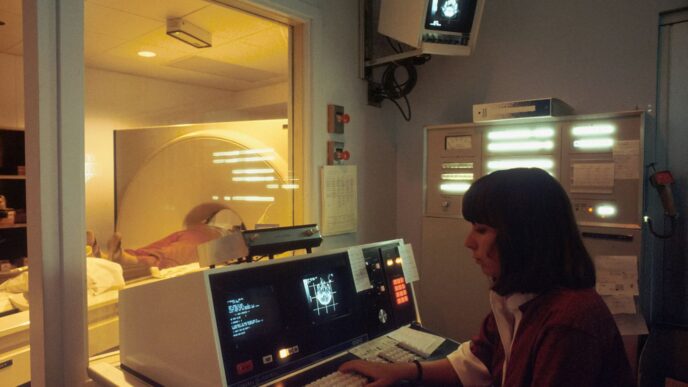So, Transcarent and Accolade are joining forces. This is a pretty big deal in the world of healthcare, aiming to make things simpler and more affordable for everyone. Think of it as combining two companies that want to help people figure out their health benefits and get the right care, without all the usual headaches. They’ve already gotten past a major hurdle with regulatory approval, which means this merger is moving forward. It’s all about using technology, like AI, alongside real people to guide you through the healthcare system. The goal is to make it easier to find good doctors, understand your options, and ultimately, save money on healthcare costs, which, let’s be honest, is something we all want.
Key Takeaways
- The Hart-Scott-Rodino waiting period has expired, clearing a major regulatory hurdle for the Transcarent and Accolade merger. This means the deal is on track to be completed soon.
- This merger brings together Transcarent’s AI-driven WayFinding tool with Accolade’s existing services like health advocacy and primary care, creating a new kind of healthcare navigation system.
- The combined company expects to improve access to doctors and facilities for its members and help employers manage rising healthcare costs.
- The integration aims to use both technology and human support to help people make better choices about their health and care.
- This deal is seen as a significant move in the digital health space, potentially leading to more consolidated services and a better overall experience for consumers.
Transcarent and Accolade Merger: A New Healthcare Landscape
Regulatory Milestone Achieved: Hart-Scott-Rodino Waiting Period Expiration
The waiting period under the Hart-Scott-Rodino Antitrust Improvements Act has officially ended for the Transcarent and Accolade merger. This regulatory step is a big deal, clearing a major hurdle and putting the companies one step closer to joining forces. It means the government antitrust review is complete, allowing the deal to move forward, assuming Accolade’s stockholders give their final approval. This clearance is a positive sign, suggesting that regulators didn’t find significant competitive issues with the combination.
Strategic Combination of AI and Human-Centric Care
This merger is all about blending two different strengths. Transcarent brings its AI-powered WayFinding tool, which helps people figure out where to go and what to do in the complex world of healthcare. Accolade, on the other hand, has a strong track record in human support, offering services like health advocacy and expert medical opinions. By putting these together, the goal is to create a more complete and supportive experience for patients. Think of it as having a smart digital guide that’s backed up by real people who can help when things get tough.
Creating the Next Generation of Healthcare Navigation
What does this mean for the future? The companies believe they are building something entirely new, going beyond what’s typically called ‘healthcare navigation.’ They aim to provide a single place where people can get help with their health and care needs. This integrated approach could make it easier for individuals to make better decisions about their health, find the right providers, and manage their medical journeys more effectively. It’s an attempt to simplify a system that often feels overwhelming for many.
Enhanced Health and Care Access Through Integration
Expanding Clinician and Facility Networks for Members
This merger is all about making it easier for people to get the care they need. By bringing together Transcarent’s and Accolade’s networks, we’re looking at a much bigger pool of doctors and hospitals available to members. Think of it like getting access to a super-sized directory of healthcare providers. This means more choices, and hopefully, less hassle when you need to find a specialist or a specific type of facility. It’s about connecting people to the right care, faster.
Addressing High Healthcare Costs for Employers
Let’s be real, healthcare costs are a big worry for employers. This combination aims to tackle that head-on. The idea is that by integrating services and making care more accessible and understandable, we can cut down on unnecessary spending. When people can easily find the right care and make informed decisions, they tend to use services more wisely. This could mean fewer emergency room visits for things that could be handled elsewhere, and better management of chronic conditions, which all adds up to savings for businesses.
Empowering Consumers with Better Decision-Making Tools
Nobody likes feeling lost when it comes to their health. This merger is trying to fix that by giving people the information they need, when they need it. Imagine having a clear guide that helps you understand your options, compare treatments, and know what to expect cost-wise.
- Personalized guidance: Get advice tailored to your specific health situation.
- Cost transparency: See upfront costs for procedures and visits.
- Provider comparisons: Easily compare doctors and facilities based on quality and cost.
The goal is to move away from a system where people feel overwhelmed and towards one where they feel confident in managing their health journey. It’s about putting the power back into the hands of the individual.
Ultimately, this integration is designed to create a more connected, cost-effective, and user-friendly healthcare experience for everyone involved.
Synergies Between Transcarent and Accolade
Integrating Generative AI with Advocacy and Primary Care
This merger is really about putting two strong pieces together to make something even better. Transcarent brings its smart, AI-driven WayFinding tool, which is pretty neat for helping people figure out their health benefits and find care. Think of it like a super-smart guide. On the other hand, Accolade has a solid track record with its human-focused advocacy, getting people expert medical opinions, and providing primary care services. By combining Transcarent’s generative AI with Accolade’s established advocacy and primary care, the goal is to create a more complete and helpful experience for everyone using the system. It’s not just about technology; it’s about using that tech to support real people and their health journeys.
Leveraging Transcarent’s WayFinding with Accolade’s Expertise
What’s really interesting here is how Transcarent’s WayFinding, which uses AI to help people understand and access their healthcare, will work alongside Accolade’s deep experience in helping members. Accolade has been doing this for a while, building trust and providing direct support. Now, imagine that personal touch being amplified by AI that can instantly process information and guide users. This blend aims to make healthcare navigation less confusing and more efficient. It’s about making sure that when someone needs help, they get it quickly and accurately, whether it’s through a digital tool or a person.
A Unified Platform for Improved Health Outcomes
Ultimately, the big picture here is building a single platform that makes a real difference in people’s health. This isn’t just about combining two companies; it’s about creating a new way for people to manage their health. The idea is that by integrating these different strengths, the new company can offer a more connected and supportive experience. This could mean better access to doctors, clearer information about treatments, and more proactive support for managing chronic conditions. The hope is that this unified approach will lead to better health for individuals and potentially lower costs overall for employers and the healthcare system. It’s a move towards making healthcare simpler and more effective for everyone involved, aiming for a future where technology and human support work together.
The combination of advanced AI for guidance and experienced human support for complex needs is designed to simplify the often-overwhelming process of healthcare decision-making. This integrated approach seeks to provide clarity and confidence to individuals navigating their health journeys.
The Future of Healthcare Navigation

So, what does all this mean for how we find and use healthcare going forward? It feels like we’re on the cusp of something pretty big. The merger between Transcarent and Accolade isn’t just about two companies joining forces; it’s about rethinking how people actually get care. Think about it: healthcare is complicated. You’ve got insurance, doctors, specialists, bills – it’s a lot to juggle. The goal here is to make that whole process way simpler.
A Response to Rising Healthcare Spending
Let’s be real, healthcare costs are out of control. Employers are feeling the pinch, and that means higher premiums and deductibles for everyone. It’s projected that employer healthcare costs could jump nearly 8% next year, which is the highest it’s been in ages. A big chunk of that is driven by things like cancer treatments, back and joint issues, and heart problems. This merger is partly a direct answer to that problem. By bringing together different tools and services, the idea is to steer people toward more affordable, yet still high-quality, care options. It’s about getting more bang for your buck, both for companies and for individuals.
The Role of Technology in Personalized Care
This is where the AI stuff comes in. Transcarent has been working with generative AI to help people figure out their best path through the healthcare system. Accolade brings a strong human touch with their advocates and primary care doctors. The plan is to blend these two. Imagine having an AI that can quickly sort through your options and then a real person to talk you through it, making sure you understand everything. This combination could mean more personalized advice and support, tailored to your specific needs and situation. It’s not just about finding a doctor; it’s about getting the right care for you.
Potential for Scaled, High-Quality Healthcare Services
One of the biggest challenges in healthcare is making sure everyone gets good care, no matter where they live or what their situation is. It’s tough to scale high-quality services. But by using technology like AI, the hope is to reach more people more effectively. This merger could create a platform that supports millions of members, connecting them to a wider network of doctors and facilities. The aim is to make it easier for people to get the care they need, when they need it, without the usual runaround. It’s a big step towards making good healthcare more accessible for everyone.
The healthcare system often feels like a maze. This new combined entity is trying to build a clearer map, using smart technology and helpful people to guide you through it. The ultimate aim is to make healthcare less stressful and more effective for all of us.
Key Financial and Operational Aspects of the Transcarent Accolade Deal

Transaction Value and Financing
While the exact financial terms of the Transcarent and Accolade merger haven’t been fully detailed publicly, the deal is structured to combine two significant players in the health tech space. The transaction is moving forward with the expectation of closing in the second quarter of 2025. This timeline is contingent on receiving approval from Accolade’s shareholders and meeting other standard closing conditions. Financial advice for the deal is being provided by Evercore for Transcarent and Morgan Stanley & Co for Accolade, indicating a structured approach to the financial aspects of this significant combination.
Accolade’s Transition from Public Markets
As part of this merger, Accolade, which is currently a publicly traded company (NASDAQ: ACCD), will transition away from the public markets. This move is typical in such acquisitions, where the acquiring entity or the combined new entity absorbs the public company. This transition means Accolade’s stock will no longer be traded independently once the merger is finalized. The process requires shareholder approval, a key step in moving from a public to a private or merged operational status.
Leadership Integration and Future Operations
The integration of leadership teams from both Transcarent and Accolade will be a key focus as the companies move towards a unified operation. Glen Tullman, CEO of Transcarent, has expressed enthusiasm about bringing the companies together, highlighting a shared vision. Similarly, Rajeev Singh, CEO of Accolade, is optimistic about the combination. The operational plan involves merging Transcarent’s AI-driven WayFinding solution with Accolade’s established services like advocacy and primary care. This blend aims to create a more robust platform for healthcare navigation and support.
The successful merging of these two companies hinges on effectively combining Transcarent’s advanced AI technology with Accolade’s established human-centric care model. This integration is expected to streamline healthcare access and improve decision-making for members.
- Regulatory Clearance: The Hart-Scott-Rodino waiting period has expired, a major step forward. This indicates that antitrust regulators have reviewed the deal and found no significant competitive concerns.
- Shareholder Approval: Accolade shareholders must still vote to approve the transaction. This is a standard requirement for mergers involving public companies.
- Customary Closing Conditions: Various other conditions, typical for mergers of this nature, must be met before the deal can be finalized. These can include financial conditions and other legal requirements.
Driving Value for Employers and Members
Improving Member Engagement and Satisfaction
This merger is really about making healthcare simpler and more helpful for everyone. Think about it: you’re trying to figure out doctor’s appointments, understand bills, and maybe even deal with a serious health issue. It’s a lot. Transcarent and Accolade are teaming up to make that whole process less confusing. They want people to actually want to use their benefits and feel good about the care they’re getting.
- Personalized Support: Expect more tailored guidance, like having a dedicated person to help you sort through options.
- Easier Access: Getting to the right doctor or specialist should be straightforward, not a scavenger hunt.
- Clear Communication: Understanding your health plan and what services are available will be much clearer.
The goal is to move away from a system where people feel lost and frustrated, towards one where they feel supported and informed at every turn.
Achieving Measurable Cost Savings for Employers
Let’s be honest, healthcare costs are a huge headache for businesses. This combination aims to tackle that head-on. By guiding employees to the most effective and affordable care options, the new entity can help employers see real savings. It’s not just about cutting costs, though; it’s about spending money more wisely on care that actually works.
Here’s a look at how costs have been climbing:
| Condition | % of Employers Citing as Cost Driver |
|---|---|
| Cancer | 80% |
| MSK Conditions | 74% |
| Cardiovascular | 40% |
Simplifying the Healthcare Experience
Ultimately, this is about making life easier. For employers, it means a more satisfied workforce and a better handle on their budget. For members, it means less stress and more confidence in managing their health. The combined company is setting out to create a healthcare experience that just makes sense. It’s about bringing together smart technology with real human help to make sure people get the care they need, when they need it, without all the usual runaround.
A New Chapter for Healthcare
So, the big news is that Transcarent and Accolade are officially joining forces. This merger got the green light from regulators, which is a pretty big deal. It means they’re moving forward with combining Transcarent’s smart tech, like its AI WayFinding tool, with Accolade’s people-focused services, such as health advocacy and primary care. The goal here is to make it simpler for everyone to find and get the right healthcare without all the usual headaches. It’s like they’re trying to build a better system, one that’s easier to use and hopefully saves people money and stress. We’ll have to see how it all plays out, but it definitely feels like a step towards a different way of handling health and care.














